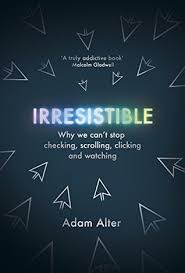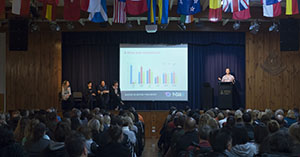ABC TV journalist Emma Alberici speaks to social psychology expert and Associate Professor of Marketing at New York University’s Stern School of Business Adam Alter and Professor at the School of Computing and Information Technology at the University of Wollongong Katina Michael about how apps are tailor-made to encourage addiction.
EMMA ALBERICI: I’m joined now from New York by Professor and author Adam Alter, he’s the author of Irresistible, the book examining our growing addiction to technology. Katina Michael is here with me in the studio, she’s Professor at the School of Computing and Information Technology at the University of Wollongong, specialising in online addiction. … Adam, how addicted are we to technology? Well, you heard a bit about it earlier on. We are greatly addicted. There was a massive study that was run in 2011, so that’s now some years ago, showing that about 41 per cent of the adult population had some form of behavioural addiction and the suggestion is that now that is probably up around 50 per cent. And Katina, is there a particular demographic or sex that is more vulnerable than another?
KATINA MICHAEL: I think our studies have shown that anyone over 14 and under 55 are as prone, for instance, to smartphone addiction. So we are all copying each other and it looks [like] normalised behaviour and given our parents are using more, children are using more and they are copying and mimicking.
EM: What constitutes addictive technology Adam, assuming it doesn’t include making calls on your phone?
AA: No that’s right, most of what goes on, on screens, so it’s the screen component of the phone that’s so difficult for us to resist. And that’s because screens can deliver all sorts of interesting rewards to us, that draw us in and that keep us engaged over time. So things like games, email, social media, texting is a big one as well. So those are just some of them. There is also shopping. Fitness devices. It’s a pretty big range of behaviours.
EM: And what do you think are the long-term consequences, negative clearly of this addictive behaviour? I mean drug addiction and gambling addictions, we know what those obvious consequences and impacts are. Katina what is the problem with being on our phone so much?
KM: I think it’s a loss of productivity, it’s a loss of time in relationships, our families, our friends, it’s this loss of the physical space where we had integrity and authenticity when we looked at each other’s eyes and said, “hi, how are you feeling today?”. It’s also a loss of dignity I think in some ways. People are seeking instant gratification online and when they don’t get reactions and likes, they feel depressed and down and I think we’re going to see a higher incidence of mental illness, types of obsessive compulsive disorders, but really unnamed disorders as such until now.
EM: Adam, you are in fact a psychology professor, is that gelling with you?
AA: Yeah, absolutely. We think of four different kinds of effects. Financial, where people spend a lot of money on experiences that they can’t resist. Social, where social lives decline. Physical, where for example, they’re glued to the couch or even over exercise if they’re addicted to smart watches. Psychological as well, for example our boredom threshold has declined to the point where you’ll get in an elevator for five seconds, take out your phone. Boredom is very important for productivity, for creativity and new ideas, and if you never allow yourself to be bored, you will never have those ideas.
EM: I will remember that when I am admonishing my children. How do you determine if whether someone is actually addicted Katina?
KM: There are a range of scales that people use. For instance, people call something as internet addiction, a broad addiction scale. Videogame addiction, which has come up in the diagnostic statistical manual for mental disorders in the US. And in other cases we look at specific apps, for example, Facebook addiction and we’ve got scales for this. And technology-specific addictions, like are you addicted to your smartphone? But increasingly we are even seeing things like cyber-sexual activity online being diagnosed as an addiction, specific to an activity.
EM: Adam is there a certain amount of hours, I mean, whether you take it to bed with you or look at it the first thing in the morning? … how do you diagnose a tech addiction?
AA: I think to a large extent it’s subjective. I think you can ask yourself if you have a problem and you’ll know. This is one of the areas where people have a pretty good intuition. They feel that their lives are being encroached upon by devices, their social lives, maybe their relationships with their loved ones and friends. They’re not experiencing nature. They’re not exercising, things like that. There are scales which I think are very useful from a diagnostic perspective but a lot of what we can answer is really just in asking ourselves, “do you feel that the device is taking over your life in some way?”
EM: Adam, you’ve written about a private school in San Francisco that I found fascinating where they use no technology in the school and curiously, 75 per cent of the parents work in the tech sector.
AA: Yeah, this was fascinating to me when you talk to the tech titans in the US and actually around the world, you would expect them to be the biggest pushers of technology in the home. You think their children would be the biggest users of Tech. But what you actually find, it’s the reverse that a lot of these tech titans refuse to let their kids near technology so they will send them to schools that don’t involve technology or don’t introduce tech until later. And a lot of them, including Steve Jobs in 2010 in an interview say things like, “You should use this device, but we do not allow it in our home and we won’t let our kids near it.” He was talking about the iPad.
EM: And these are people that ascribe to the idea that they do no evil.
AA: Exactly.
EM: What do you think about that Katina? What does that tell you?
KM: I think it’s extremely hypocritical and double standards really, I think our children are struggling with literacy all over the world and we are just placing the iPad in front of them as if that’s going to solve the problem, giving them even more access to information instead of the textbooks that we used to once hold on our backs in our schoolbags. I think we need to recheck our strategies worldwide. The laptop’s not going to make you smarter and more intelligent. I think the companies that Adam was talking about need to recheck their ethics and I think our children need to stop being sold the wrong story about what is going to make their future brighter. We have a lot to answer for as academics.
EM: What’s the advice Katina about scaling down your usage, are there any tips?
KM: Yes, my first and foremost is always the Pavlovian cue, which is an audio or visual notification that you might get, the ‘ting’ or the ‘ping’ on your phone. Or that little notification on the bottom right of your screen. How do you eradicate this? Simply, turn off the notifications. Also, I’d think about replacing the activities that you have done on line with off-line activities, whether it’s going for physical exercise, joining a community group or just getting a job. Or just speaking with your family and making real food instead of playing a game about making food. And a lot of that has to do with getting back to the physical world away from the virtual world. Leave the phone behind if you don’t need it. I just have one between five people instead of five phones where you are all gathered around the table just looking at your Twitter settings and your Twitter notifications every time you hear them beep.
EM: And play Scrabble with a person in real life.
KM: Yes.
EM: Adam, any tips?
 AA: I agree with all of those that Katina suggested and I would also say it’s important start small.
AA: I agree with all of those that Katina suggested and I would also say it’s important start small.
I think with any of these sorts of interventions and changes in your life. So one thing you could do is say, “I have dinner every day, whether it’s with other people or alone or in a home or in a restaurant, no matter where it is, I will not use my phone when I am at the dinner table.”
It’s do-able, we can all manage that. And what’s interesting is in the beginning, you get fear of missing out it, you have FOMO, you have a sport of withdrawal that you might have from any addictive experience. But in time people feel really good about that. They start to feel that that experience is richer, more colourful, more interesting. And what I’ve seen is that when I work with people who do this, it expands. They decide themselves because it feels good that they are going to do the same thing say on the weekend, maybe if between dinner and bedtime. And they all basically, universally suggest that they feel better off for having done that.
Win a copy of Adam Alter’s latest book
To go into the draw to win a copy of Adam Alter’s latest book, Irresistible, simply purchase a copy of Social Media 101 through our website before July 30. We have six copies to give away and winners will be notified by email. Purchase a copy here.



